Since the return of democracy in 1999, several elections have been conducted by the Independent National Electoral Commission (INEC), though not without reservations, hues and cries by political actors, analysts and watchers.
Of utmost concern to most Nigerians is the fact that every election since then has been a do-or-die affair, fueling anxiety that the forthcoming off-cycle governorship elections in Kogi, Imo and Bayelsa will follow the same pattern.
To the uninformed, various litigations and court judgements that unseated some governors after being sworn in necessitated off-cycle governorship elections in eight states including Anambra, Edo, Ondo, Osun, Ekiti, Kogi, Imo and Bayelsa.
While others had their governorship elections conducted at different times, Nov. 11 has been fixed by INEC for those of Kogi, Imo and Bayelsa.
Not less than 18 candidates cleared by INEC will contest the governorship election in Kogi, 17 in Imo and 16 in Bayelsa.
As usual, the political space in these states is replete with threats, violence and uncertainties about what the elections may turn out to be on Saturday.
Speaking on the build up to the polls, Mr Femi Olaniyi, the Zonal Secretary of Social Democratic Party (SDP), Southwest, said hate speeches and violent attacks could affect the polls if not carefully handled.
Olaniyi, however, said the pre-election violence in Kogi was lower compared with the situation in previous polls.
“If you check previous elections in Kogi, you will agree with me that the current level of violence is mild. I think things are changing. Rome was not built in a day. With time, our election will be completely violence free.
“The level of security deployment for this election has given many people hope that votes will surely count,” Olaniyi, also the Lagos State Chairman of SDP, said.
According to him, many people have not seen the dividends of democracy, especially in Kogi and Imo in the last few years and this is likely to affect the ruling party in those states.
“This might automatically bring a change depending on how candidates are able to sell themselves to the people with their manifestos. This might bring unexpected changes,” he said.
He, however, said the violent attacks, especially in Imo would negatively impact the election.
“Attack by unknown gunmen in Imo, though not political, will affect the polls. It can lead to voter apathy and inconclusive elections.
“We will advise INEC and security agents to beef up security around INEC offices as well as for INEC staff, including Corps members and electoral materials,” he said.
On INEC’s preparations, Olaniyi said if the promises and pledges of the commission’s Chairman, Prof. Mahmood Yakubu, were to be believed, there wouldn’t be any hitches and votes would count.
“We have seen that INEC is fully on ground and ready for the election. I don’t see any lapses on the side of INEC,” Olaniyi said.
To achieve credible polls, a political analyst, Dr Adetokunbo Pearse, said there should a total overhaul of the nation’s electoral system.
According to him, since many political actors have no regards for the rule of law and supremacy of democratic principles, the governorship elections in the three states may not be credible.
“In Kogi, we are hoping that the will of the people will overpower all tendencies to rig elections,” Pearse said.
He was emphatic that the ruling APC’s candidate, Usman Ododo had a very little chance of coming second in the poll because some top APC chieftains had turned against the party’s candidate over a battle with outgoing Gov. Yahaya Bello.
He said many political stalwarts in the state were of the view that voting for APC ‘s Ododo would be an extension of Bello’s government.
Pearse said the battle for the soul of Kogi was between PDP’s Sen. Dino Melaye and SDP’s Alhaji Murtala Ajaka.
He said PDP’s chances were boosted by the recent endorsement of Melaye by Sen. Natasha Akpoti-Uduaghan, the Senator representing Kogi Central in the 10th Senate.
“If we add all of these together, the PDP candidate’s chances are bright,” the analyst said.
However, some analysts insist that if population strength will still count during Saturday’s poll, the SDP candidate, Ajaka, an Igala man, has a better chance against APC’s Ododo, an Ebira man and cousin to Bello and PDP’s Melaye, a former senator, of Okun extraction.
The Igalas, spread across 13 of the 21 Local Government Areas of Kogi, constitute 56 per cent of the population of the state – arguably more than the other two major ethnic groups (Ebira and Okun) put together.
The entire Kogi has an estimated population of 4.5 million: lgala, two million; Ebira, close to a million, and Okun, over 800,000.
Consequently, the Igala ethnic group has been producing governors except the outgoing Bello, an Ebira man, who by providence became governor of the state following the demise of Abubakar Audu in 2015.
Dr Jibril Ahmadu, Special Adviser to Bello on Youths and Students Affairs, insists that all permutations favour the APC in the Saturday’s election.
He said in terms of incumbency, political structure and pattern of elections, APC had an upper hand against the other political parties.
Bello’s track record and performance, being used for campaign, according to him, is a strong selling point for the ruling party to retain the state.
Ahmadu predicted APC’s victory because the party had been in power in the last eight years and delivered 100 per cent votes to President Bola Tinubu in the last Presidential Election.
“Tell me, where is the opposition parties’ imagination coming from to win Kogi, it is not possible. APC is unrivalled,” he said.
In Bayelsa, Pearse said being a traditional PDP state, coupled with good performance by incumbent Gov. Douye Diri, the governor was likely to retain his seat.
“Bayelsa has a governor who has evidently performed well and enjoys popularity, and there has not been a lot of violence there. PDP’s candidate appears to be in good stead there,” the analyst said.
Again in Imo, Pearse said peace should be allowed to reign, and that the incumbent, Hope Uzodinma, should talk to his party’s supporters to deescalate the violence pervading the atmosphere for a credible election.
He, however, said with the present situation in the state, it appeared that Uzodinma would over power other contestants.
“We call on election monitors to look closely at Imo and other states for a level playing field,” said Pearse.
Despite several reassurances, political watchers have expressed concerns and fear about the steep road to the Nov. 11 elections, considering the history of elections in the three states.
Campaigns have been characterised by violence in some places, hence INEC and other stakeholders have been calling for calm and violence-free elections.
One of the flash points of electoral violence is Kogi. The state is characteristically volatile when it comes to elections. One cannot easily forget violent attacks that occured in the last governorship election conducted in November 2019.
According to a report released on Nov. 19, 2019 by the Centre for Democracy and Development, (CDD), after Kogi governorship election, the group posited that the state recorded 10 deaths and 79 cases of violence and electoral crimes.
The report, signed by the group’s director, Idayat Hassan, said the untoward incidents included the hijack of electoral materials by thugs, kidnap of INEC ad hoc staff, vote buying, attacks on observers, intimidation of voters, under-aged voting, widespread stuffing of ballot boxes, ballot snatching and multiple voting.
One such case was the gruesome murder of the PDP women leader of the Wada/Aro campaign council, Ochadamu Ward, Acheju Abuh, who was burnt alive in her home by suspected political thugs.
As if no lesson was learnt, several other violent attacks have been recorded in the state in the build up to the Nov. 11 polls.
Barely four days to the polls, a Joint Security Operation on Tuesday reportedly killed three suspected political thugs in their hideout in Anyigba, while operatives recovered two AK47 rifles from the suspected thugs.
In another development on Tuesday, members of the SDP led by the party’s candidate, Ajaka, stormed the Police headquarters in Abuja to protest the killing of three policemen and some members of the party in Anyigba.
Reportedly, trouble started when some thugs allegedly operating under the guise of state Joint Taskforce attacked the residence of the Campaign Director General of SDP, Sheikh Ibrahim, in the early hours of Tuesday, leading to the killing of the police men and abduction of six SDP members.
Also, scores of women activists converged on Abuja on Tuesday, demanding justice for the gruesome murder of Khadijat Yahaya, APC supporter, by suspected political thugs in Kotonkarfe area of the state over a month ago.
The escalating security situation unarguably necessitated the deployment of over 40,000 policemen across the state to ensure a peaceful election.
It will be recalled that on July 24, political thugs burnt down SDP campaign office in Lokoja.
Also, on July 10, it was reported that suspected thugs invaded the SDP campaign office and destroyed billboards, showing the picture of President Bola Tinubu alongside the SDP governorship candidate.
Meanwhile, on June 3, Ajaka escaped assassination by whiskers when his convoy was attacked by gunmen, and a similar occurrence was reported of Gov. Yahaya Bello.
IMO is another hotbed of agitation, where there seems to be no end to killings since the assumption of office by Gov. Hope Uzodinma.
In September, unidentified gunmen attacked and allegedly killed no fewer than eight security operatives including soldiers and police, and also set ablaze two vehicles in Imo.
Also, the recent attack on Mr Joe Ajaero, the president of Nigeria Labour Congress (NLC), allegedly by political thugs, over a planned protest in Imo was also an indication of the likelihood of violence in the state.
In Bayelsa a PDP-led state, Diri will slug it out with a former governor of the state, Chief Timipre Sylva of APC.
Tension mounted in the state a few days ago when a court disqualified Sylva, with the subsequent removal of the APC candidate from the list of contestants by INEC.
The CDD report said although there was no record of death in Bayelsa in the 2019 governorship election, observers said over 50 critical incidents, which directly impacted the credibility of the election were observed.
However, in the build up to 2023 general elections, no fewer than three persons were reportedly shot dead in the Nembe Local Government Area of Bayelsa following a clash involving two rival cult groups.
INEC Chairman, Yakubu, at a meeting with various security agencies in Imo to strategise on security for the Nov. 11governorship election, said Kogi, Bayelsa and Imo were not the easiest states to conduct elections.
Yakubu said the states were faced with prevailing security situations, peculiar topography and behaviour of some of the political actors, which impeded the conduct of free and fair elections.
“Our commitment is to protect the integrity of the process so that whoever the people vote for becomes their governor,” the INEC boss stated.
At a stakeholders’ meeting convened by the Nigeria Civil Society Situation Room on Oct. 31 in Abuja, Sen. Sharafadeen Alli, Chairman, Senate Committee on Electoral Matters, urged security agencies to ensure their personnel remained unbiased during the elections.
“It is only commitment from both security officials and the citizens that can guarantee an improvement in the electoral system.
“The National Assembly has commenced its oversight with the engagement of INEC in connection with the preparedness towards the off-cycle elections in the respective states,” he said.
Alli advised eligible voters not to allow themselves to be used by desperate politicians for electoral manipulations because such manipulations could disrupt the entire electoral process.
Speaking at the INEC quarterly meeting with leaders of political parties, on the governorship election on Oct. 24, IPAC Chairman, Mr Sani Yabagi, urged INEC to use the November governorship election to deal with confidence deficit among the citizenry.
“It is essential for INEC, as the custodian of our democracy, to address this issue comprehensively.
“To reaffirm citizens’ confidence, INEC must continue to demonstrate impartiality, transparency, and a commitment to conducting free, fair, and credible elections.
“This is not only a moral imperative but a necessary step towards preserving the integrity of our democratic system,” he said.
The Inspector-General of Police (I-G), Mr Kayode Egbetokun, has warned that the police would not tolerate electoral violence and killing in Kogi, Imo and Bayelsa during the governorship elections on Saturday.
Egbetokun reaffirmed this position during a courtesy visit to Diri on Monday in Yenagoa.
He stressed that the police and other security agencies were fully prepared and duty-bound to ensure free and fair polls, adding that troublemakers would have the law to contend with.
“In Bayelsa and in Kogi and Imo elections will take place, I want to say with confidence that the police and other security agencies have taken a position to be neutral.
“However, those with criminal intention to disrupt the election in Bayelsa will meet our men on ground. They will have the whole of us to contend with,” Egbetokun said.
Similarly, the Chief of Defence Satff (CDS), Gen. Christopher Musa, warned those planning to disrupt the governorship elections in Bayelsa, Imo and Kogi to stay off the states.
Speaking with with journalists shortly after the Inter-Agency Consultative Committee on Election Security (ICCES) meeting on Oct. 28, in Abuja, Musa assured residents of Bayelsa, Imo and Kogi not to entertain any fear.
“The armed forces, the police and other security agencies would be on ground. Every Nigerian, we are sure is tired of elections with violence and this will try to make a different.
“We want at the end of the day, every Nigerian should be proud of, first to be a Nigerian and to understand that elections are now free and fair.
“We want everybody who wins our elections to be happy that he won very well without any intimidation,” he said.
Indeed, it is time for Nigeria to urgently provide the leadership needed to rescue the nation’s electoral and democratic process from irreversible decline and unwarranted loss of human lives and property to election.
Let us begin with the governorship polls in Kogi, Imo and Bayelsa. (NAN)


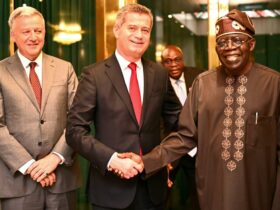



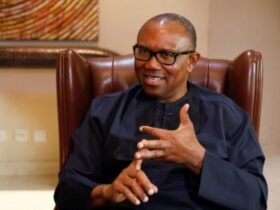
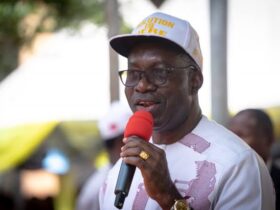

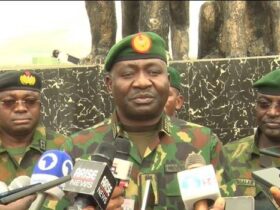
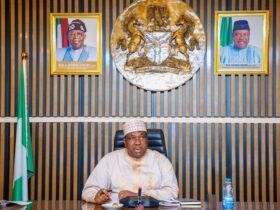
Leave a Reply